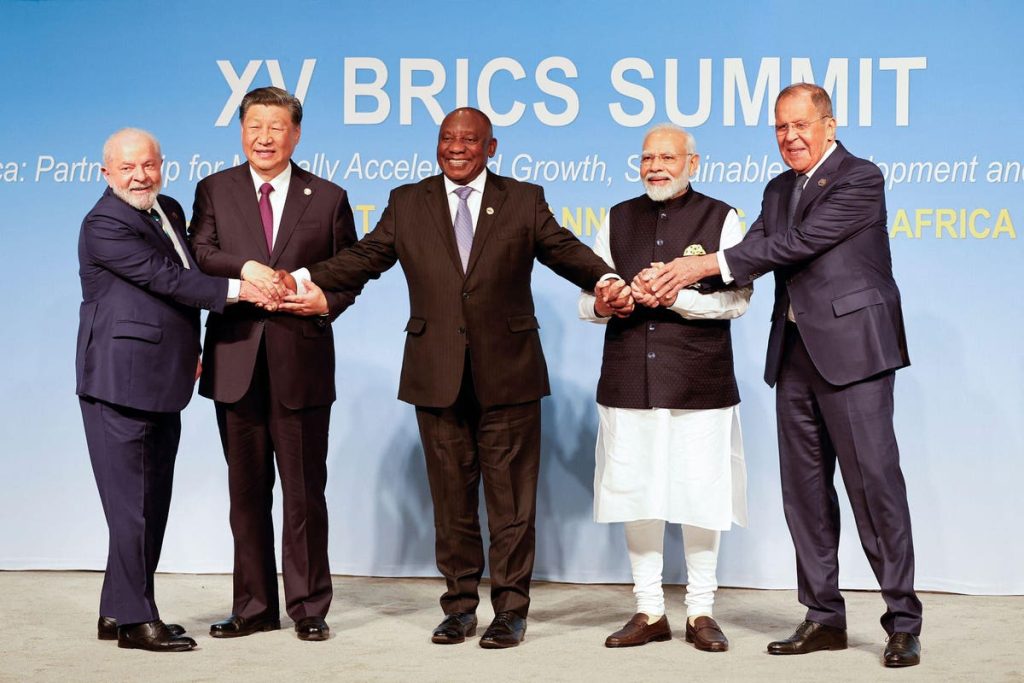The BRICS bloc (Brazil, Russia, India, China, and South Africa) have invited six other nations to join. At the bloc’s annual summit in Johannesburg, South African President Cyril Ramaphosa announced that the group would like Saudi Arabia, the United Arab Emirates, Iran, Egypt, Ethiopia, and Argentina to join. It looks as though most will accept. According to Egyptian President Abdel Fattah el-Sisi, the enlarged bloc will “raise the voice of the global south.”
Mostly because the BRICS bloc has engaged in few significant global initiatives, the announced enlargement caused only ripples of interest in the media. What did gather attention was the simultaneous proposal from Brazilian President Luiz Inacio Lula da Silva for the enlarged group to issue common currency. This prospect renewed recuring speculation that the dollar will soon lose status as the world’s primary medium international exchange and premier reserve currency. In just the past year or so such speculation has also whirled around China’s yuan as a replacement for the dollar’s global role. The reaction is understandable, but for all the interest, neither the yuan nor a new BRICS unit can dethrone the dollar any time soon, if ever.
This is not the first time Lula has challenged the dollar. Recently, he pressed the Mercosur bloc of South American countries to establish a common currency and trade in it instead of in dollars. In neither that case nor the BRICS one – especially the BRICS one – is he likely to make much headway. Certainly, Lula cannot arrange both common currencies at once except in the highly unlikely event that the members of the Mercosur and BRICS bloc agree to form around a single currency.
Even among the BRICS membership, agreement on such a step unlikely. Neither China nor Russia nor India seem ready to give up control of their own currencies in the way that several European nations did with the establishment of the euro and the European Central Bank (ECB). India Foreign Minister Subrahmanyam Jaishankar has already responded to the proposal in the negative, saying “there is no idea of a BRICS currency.” Russia’s Putin was less blunt but neither did he embrace the idea. China might like the idea but only because that country’s relative economic and financial power would render such a common currency an extension of its yuan.
Even in the unlikely event that the BRICS bloc could settle on a common currency, the new unit would have little chance of supplanting the dollar in its global role. Such an arrangement might exclude the dollar a role in trade among the BRICS membership, but even then, any member with an interest in trading outside the bloc – which is all of them – would have to deal in dollars. In time perhaps, as the economic and financial power of the BRICS bloc grew, its common currency could command attention outside its circle. The International Monetary Fund (IMF) might even give it a role in its officially recognized basket of reserve currencies, as it has granted China’s yuan such recognition. But even then, the new unit could not gain traction before it turned the long-standing trade custom that gives the dollar dominance in some 90% of international trading whether an American is involved or not.
Another important aspect of the matter would defend the dollar from a challenge by a BRICS unit or the yuan. The dollar gains huge support from America’s broad and deep financial markets. Because importers and exporters, as well as their financial backers, must maintain large holdings of any currency serving as a global medium of exchange, such a currency must offer them a wide range of financial vehicles as well as facilities to move into and out of that currency and others quickly and easily. Financial markets in the United States do that for the dollar. None of the existing or prospective members of the BRICS bloc can offer anything close, and some, such as China, exercise considerable control over financial flows.
For some time now, political figures and journalists have speculated about what will dethrone the dollar. When the euro was created late in the last century, such talk arose about it. When in the 1980s and 1990s Japan seemed an unbeatable economic machine, such speculation centered on its yen. More recently, China’s spectacular economic rise has brought its yuan such attention. Indeed, the United States has lost a lot of the relative economic power and stability that helped the dollar establish its global role decades ago. But for all the dollar’s lost glory, it remains the only currency with the economic reach and financial support to serve in this role. Someday, something will come along to dethrone the dollar from its global status, but not any time soon and certainly not an improbable BRICS unit.
Read the full article here









